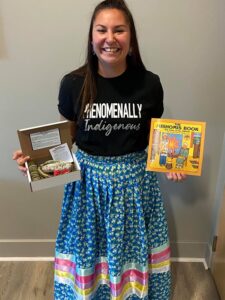Aamjiwnaang First Nation bridges cultural and traditional knowledge gap for local youth and young adults

By Colin Graf
AAMJIWNAANG FIRST NATION— Have you ever been at an event where you feel you should know what’s going on, but don’t really have a clue? Bridging that kind of gap around ceremonies and other aspects of traditional Anishinaabe culture is the goal of a new online program for youth and young adults in Aamjiwnaang First Nation.
The program, Claim Your Culture, arose from the personal experiences of Aamjiwnaang’s cultural recreation planner Carrie Plain, 24. Returning from post-secondary in Ottawa, she remembers feeling as if a piece of her was missing.
“I had a hole in myself I needed to fill,” she says.
Turning to her grandmother, Plain learned different aspects of traditional culture including how to sew her own ribbon skirt.
Working mostly with children and youth in the community, she was teaching some cultural material and soon realized there would be a demand among an older group.
“I figured other people were feeling that missing piece too,” she adds.
And so, Claim Your Culture was planned for ages 16-29. The group has about 40 members with around 10 attending each bi-weekly meeting. Plain expects more when members of the year-long program can meet in person as COVID-19 pandemic restrictions are relaxed.
So far this year, the Claim Your Culture participants have covered “the basics,” such as ceremony etiquette and the use of the four traditional medicines, according to Pam Plain, Youth Well-Being Services Coordinator with the Anishinabek Nation, who acts as teacher and Knowledge Keeper for the program. She says the group has also had guest leaders who have started looking at “the deeper stuff,” such as the spirit’s journey and the seven stages of life.
Most in the group didn’t grow up with many of the teachings and didn’t take part in ceremonies, Carrie Plain says, whether that’s due to gaps between generations caused by residential schooling, or by other factors.
“I see a lot of people wanting to get it back,” she notes.
Plain has sensed some awkwardness among the teenagers in the group.
“Sometimes they get intimidated and feel like they should already know this stuff so they kind of shy away from ceremony. We just want to help teach them the things they missed out on growing up,” she explains.
Other members are young adults with their own children, who want to be able to pass the teachings on, the recreation planner says.
Another factor adding to interest in the Claim Your Culture program is the discovery this year of the unmarked graves at the site of former Indian Residential Schools, Plain says.
“It kind of drives them to know more about what was taken from us.”
As the weeks progress, the group will start meeting in-person to make ribbon shirts and skirts, and hopefully hold a sweat, Full Moon Ceremony, and cedar foot soak, as part of their full-year learning journey. Learning how to be water- and fire-keepers will be part of their curriculum as well, Carrie says. It can be hard to find fire-keepers for funerals in Aamjiwnaang, and she hopes the course will produce volunteers to take up the role for the future.
Plans are to have a big feast at the end of the program “to celebrate our accomplishment, and celebrate each other,” she explains. The culmination is expected to be a naming ceremony in which each member will be given a spirit name.
Claim Your Culture has had a lot of support from Elders and community members who offered to help, Carrie says, although at the beginning of the COVID-19 pandemic, some people were hesitant about sharing teachings online, as they felt that such serious subjects should only be shared in-person, where people can be “taking it all in,” she recalls. Yet, as lockdowns continued, Elders have warmed to the idea of sharing online, the planner has found.
Pam Plain remembers the difficulties learning about her culture as a child, and was keen to help with the program when Carrie asked her. While she learned dancing and crafts from her grandparents, Pam recalls ceremonies “were outlawed and were done in private.” She didn’t attend any events until her late 20s and 30s.
Now as a knowledge keeper herself, the elder Plain enjoys sharing with the younger generations. The timing of Claim Your Culture is “perfect” in light of the shock of the unmarked graves that is sweeping across First Nations, she feels.
“The idea [of the schools’ founders] was to kill the Indian in the child, and now we have this program to start to bring back the Indian in the child,” she says.
She remembers the feelings of shyness or apprehension when she started learning because she felt she should already know about these things, “so I had a little bit of shame about that”.
“I know how it is for these younger ones, and they are probably asking themselves the same question, but it’s not our fault we didn’t learn. It was because of the way it was in society. Our culture was looked down upon, it was taboo or witchery, whatever the colonizers called it,” Pam explains. “But now I carry it with pride and I attend ceremony. So I do everything I can to share it.”

